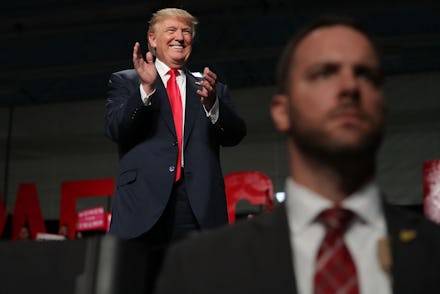Donald Trump just demolished everything we thought we knew about politics and campaigning

For months, analysts on both sides of the aisle said it could never happen.
Donald Trump, they said, was a historically bad candidate whose campaign rhetoric just wouldn't fly in an increasingly diverse country with an multicultural electorate.
But win he did, blowing up every last ounce of conventional wisdom and shocking a political class whose industry will debate for years why so many got it so wrong.
Trump only led Hillary Clinton in the RealClearPolitics national polling average for two days of the entire election. That was back in July, immediately after the Republican National Convention and before the Democratic National Convention kicked off, helping heal the schism caused by the drawn-out Democratic primary between Clinton and anti-establishment challenger Bernie Sanders.
Political forecasting models all projected a Clinton win, though the probability waned in the final days of the race as public polls tightened.
Still, even as public polling slid, Democrats insisted their private polling had Clinton ahead — albeit by slimmer margins. And Democrats added that their superior data and voter mobilization operation would amount to at least a handful of points over Trump.
Yet none of those things were true.
Ultimately, Trump's win shows that the media and political professionals, "misunderstood the Republican Party and the level of energy around that outsider candidate — a different kind of candidate," said Stu Rothenberg, who, like most political analysts, called the final outcome of the race wrong.
Like analysts did in the primaries, where they discounted polling and data that showed Trump with a clear lead, analysts and the media who relied on them discounted movement in the polls following FBI Director James Comey's last-minute bombshell that the FBI was reviewing new emails possibly tied to Clinton's use of a private server as Secretary of State.
Some analysts fluffed that movement off as noise.
They maintained that the race had always been stable in the general election, and that fleeting blips in support were due to supporters of either candidate not wanting to tell pollsters their voting intentions when their candidate was receiving unfavorable news.
Of course, some analysts sounded alarm bells, suggesting they weren't as secure in their forecasts as they were in previous years.
That includes Nate Silver, the data guru and founder of FiveThirtyEight, which had Clinton's final odds at victory at 71%.
But the polling industry will be forced to have a reckoning to determine how they got it so wrong.
Trump's win will also have lasting impacts on how campaigns are run.
Many will study whether Trump was merely a unique phenomenon, who defied political norms from the beginning and made it hard to run a conventional campaign.
He won after being vastly outspent on the television airwaves, usually a good measure of how well a candidate will fare.
And his data and ground game operation were panned as inferior to Clinton, and he won anyway.
Trump's win "undermines the whole notion that a ground game is important, because he had no ground game," said Rothenberg, who, like most political analysts, called the final outcome of the race wrong.
"We misunderstood the Republican Party, the level of energy around that outsider candidate — different kind of candidate," Rothenberg added. "[It was a] misunderstanding about how broad and how deep those sentiments were. And not among Democrats but among Republicans and presumably swing voters."